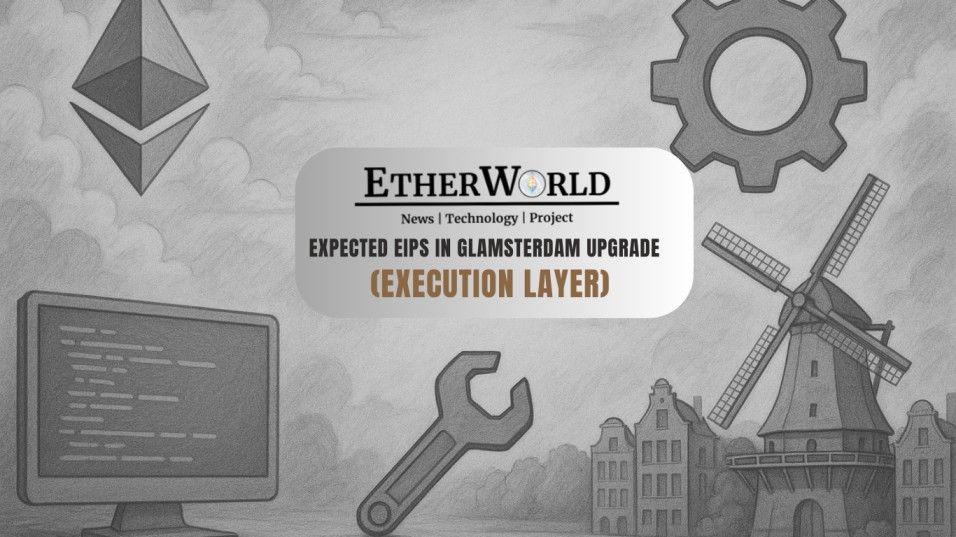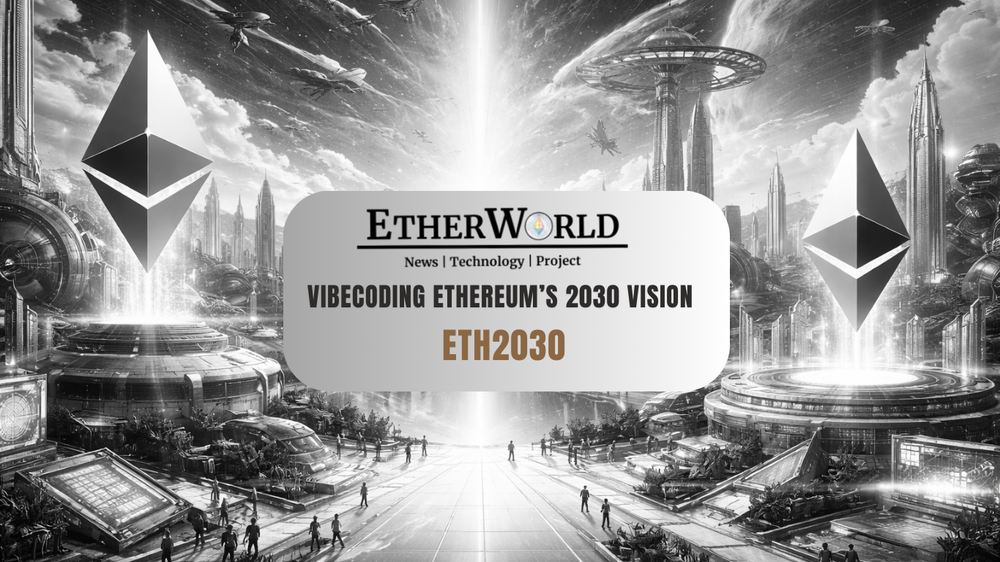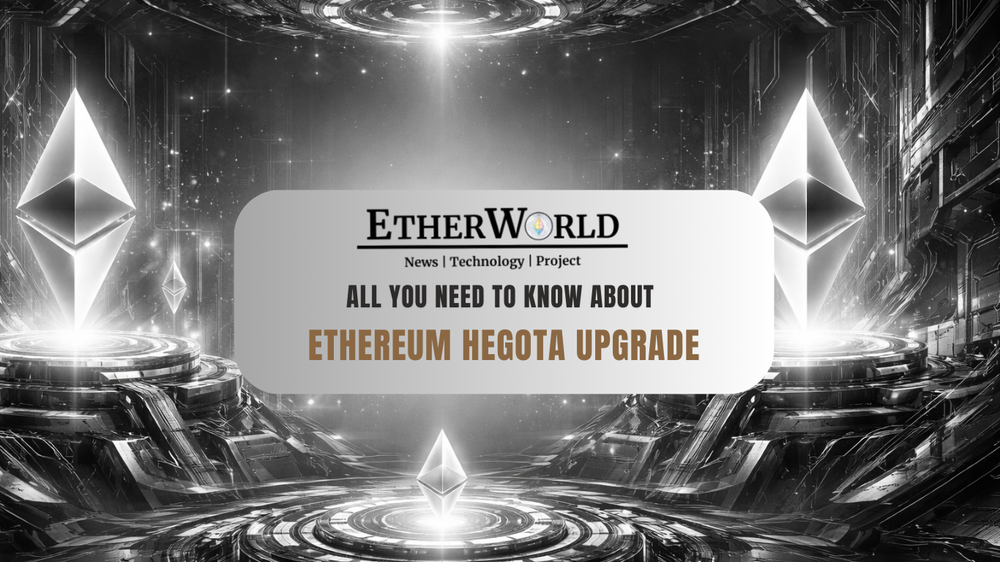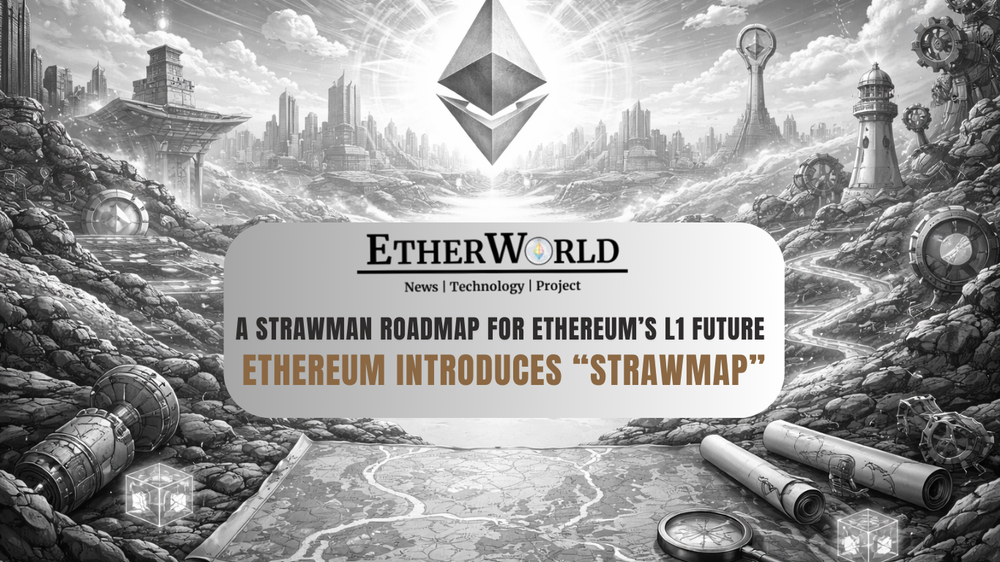Expected EIPs in Glamsterdam Upgrade (Execution Layer)
Glamsterdam upgrade brings key Execution Layer EIPs that boost Ethereum’s scalability, developer experience, security & user usability.

Ethereum’s upcoming Glamsterdam upgrade is set to transform the execution layer with a wide range of EIPs that improve scalability, developer experience, security, and user experience. Building on the foundation laid by Fusaka, Glamsterdam introduces changes that address performance bottlenecks, enable more powerful contracts, and enhance the safety of Ethereum’s decentralized ecosystem.
- EIP-7928: Block-level Access Lists
- EIP-2926: Chunk-Based Code Merkleization
- EIP-5920: PAY Opcode
- EIP-6873: Preimage Retention
- EIP-7667: Raise Gas Costs of Hash Functions
- EIP-7791: GAS2ETH Opcode
- EIP-7793: Conditional Transactions
- EIP-7819: SETDELEGATE Instruction
- EIP-7843: SLOTNUM Opcode
- EIP-7903: Remove Initcode Size Limit
- EIP-7907: Meter Contract Code Size & Increase Limit
- EIP-7919: Pureth – Provable RPC Responses
- EIP-7923: Linear, Page-Based Memory Costing
- EIP-7932: Secondary Signature Algorithms
- EIP-7979: Call & Return Opcodes
- EIP-7980: Ed25519 Transaction Support
- EIP-7981: Increase Access List Cost
- EIP-7997: Deterministic Factory Predeploy
- EIP-7999: Unified Multidimensional Fee Market
- EIP-7692: EVM Object Format (EOFv1) Meta
- EIP-7886: Delayed Execution
- EIP-7937: 64-bit Mode Opcodes (EVM64)
EIP-7928: Block-level Access Lists
This proposal introduces access lists at the block level rather than individual transactions. It reduces gas costs for applications that repeatedly access the same state and improves efficiency for both developers and node operators. End users will benefit from cheaper DeFi transactions, while developers gain predictability in gas usage.
EIP-2926: Chunk-Based Code Merkleization
EIP-2926 restructures smart contract bytecode into fixed-size chunks stored in a Merkle Patricia Trie. This reduces bandwidth usage, makes proofs smaller, and supports stateless clients. It is particularly beneficial for rollups and real-time proving systems, aligning closely with Ethereum’s long-term scaling strategy.
EIP-5920: PAY Opcode
The PAY opcode enables ETH transfers without executing recipient code. This change removes reentrancy risks and DoS vectors caused by fallback functions, strengthening contract security. Developers can rely on safer transfer mechanics, while users enjoy greater reliability in ETH-based applications.
EIP-6873: Preimage Retention
To enable the transition to Verkle Trees, EIP-6873 ensures that nodes temporarily store preimages for addresses and storage keys. This safeguard maintains state integrity during migration. Although invisible to end users, it is a vital protocol-level enhancement for Ethereum’s stateless future.
EIP-7667: Raise Gas Costs of Hash Functions
By raising the gas costs for hashing operations, Ethereum can prevent abuse from hash-heavy blocks and align costs with real-world proving requirements. This discourages inefficient contract designs and strengthens network decentralization.
EIP-7791: GAS2ETH Opcode
The GAS2ETH opcode introduces a direct way for smart contracts to convert consumed gas into ETH payments. It provides a native monetization model for developers and public goods, eliminating reliance on external tokens or DAOs.
EIP-7793: Conditional Transactions
Conditional transactions become valid only at a chosen slot and index within a block. This prevents frontrunning in encrypted mempools and ensures fairer transaction ordering. Developers gain tools to design more predictable execution flows.
EIP-7819: SETDELEGATE Instruction
SETDELEGATE simplifies the creation of upgradeable contract clones by moving delegation logic into the protocol itself. Developers benefit from reduced complexity and gas savings, while users experience smoother interactions with upgradeable smart accounts.
EIP-7843: SLOTNUM Opcode
This opcode allows contracts to read the current slot number directly, making applications more robust if Ethereum’s slot duration changes. It reduces reliance on timestamps and provides a simpler, cheaper method for tracking block time.
EIP-7903: Remove Initcode Size Limit
The removal of the 49KB initcode limit makes it easier to deploy large and complex contract systems in a single transaction. This benefits developers building advanced DeFi protocols and reduces inefficiencies caused by multi-transaction deployment workarounds.
EIP-7907: Meter Contract Code Size & Increase Limit
By raising the contract size limit to 256KB and introducing gas metering for larger contracts, Ethereum empowers developers to create sophisticated single-contract applications. This avoids reliance on multi-contract architectures and unlocks new possibilities in dApp design.
EIP-7919: Pureth – Provable RPC Responses
Pureth enables cryptographic proofs for RPC responses, removing the need to trust RPC providers. It makes light clients more secure, improves decentralization, and allows developers to build trustless applications that interact with Ethereum data directly.
EIP-7923: Linear, Page-Based Memory Costing
This proposal replaces Ethereum’s quadratic memory expansion with linear page-based costing. By introducing 4KB memory pages and predictable fees, it helps contracts manage memory more efficiently and lowers the chance of failed transactions due to gas misestimation.
EIP-7932: Secondary Signature Algorithms
Ethereum gains flexibility by standardizing support for alternative signature algorithms. This prepares the network for quantum-resistant cryptography and allows wallets to integrate diverse security models.
EIP-7979: Call & Return Opcodes
The Call and Return opcodes introduce subroutine functionality into the EVM. This enables static control flow, which improves analysis, formal verification, and compiler performance. Developers can write more efficient and secure code.
EIP-7980: Ed25519 Transaction Support
Adding support for Ed25519 signatures strengthens Ethereum’s cryptographic toolkit and ensures compatibility with other blockchain systems. Wallets gain flexibility, and developers can build applications with broader interoperability.
EIP-7981: Increase Access List Cost
This adjustment raises the cost of large access lists, discouraging inefficient transaction design and reducing block size inflation. The change improves economic fairness across Ethereum users.
EIP-7997: Deterministic Factory Predeploy
EIP-7997 ensures that contracts can be deployed at the same address across multiple Ethereum-compatible chains. It simplifies dApp development and enhances the user experience in multi-chain ecosystems.
EIP-7999: Unified Multidimensional Fee Market
With a unified fee structure that spans storage, computation, and bandwidth, Ethereum simplifies fee management and enhances resource allocation efficiency. Users and developers alike benefit from greater transparency in transaction pricing.
EIP-7692: EVM Object Format (EOFv1) Meta
EOFv1 introduces a new container format for EVM bytecode that enables code versioning and compatibility with alternative execution environments like RISC-V and EVM64. This reduces complexity in execution and improves tooling for developers.
EIP-7886: Delayed Execution
Delayed execution allows validators to attest blocks before executing transactions. This reduces validation latency, improves throughput, and supports higher block gas limits. Although transparent to users, developers must handle deferred receipts.
EIP-7937: 64-bit Mode Opcodes (EVM64)
The introduction of 64-bit arithmetic operations to the EVM reduces gas costs for math-heavy applications. DeFi, gaming, and scientific computing applications benefit from improved computational efficiency, making Ethereum more competitive.
By combining gas optimizations, new opcodes, security enhancements, and improved developer tooling, it pushes Ethereum closer to its vision of being a scalable, secure, and user-friendly settlement layer. These EIPs not only resolve current bottlenecks but also lay the groundwork for a more flexible and sustainable future.
If you find any issues in this blog or notice any missing information, please feel free to reach out at yash@etherworld.co for clarifications or updates.
Related Articles
Disclaimer: The information contained in this website is for general informational purposes only. The content provided on this website, including articles, blog posts, opinions, & analysis related to blockchain technology & cryptocurrencies, is not intended as financial or investment advice. The website & its content should not be relied upon for making financial decisions. Read full disclaimer & privacy policy.
For Press Releases, project updates & guest posts publishing with us, email contact@etherworld.co.
Subscribe to EtherWorld YouTube channel for ELI5 content.
Share if you like the content. Donate at avarch.eth.
You've something to share with the blockchain community, join us on Discord!




